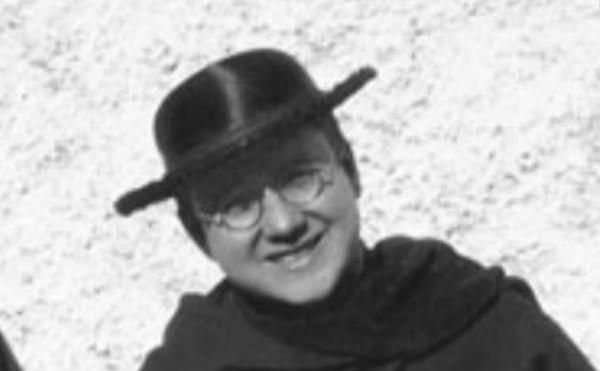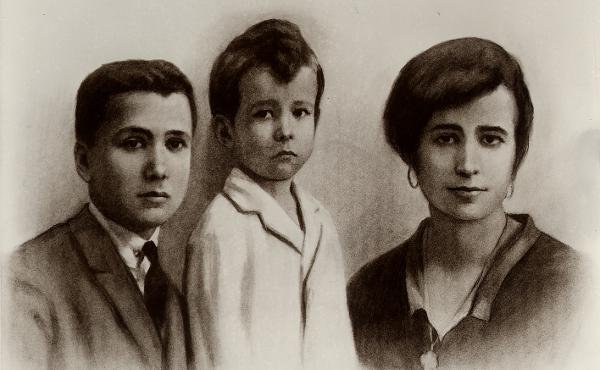On Wednesday, 9 January 1918, Josemaría Escrivá de Balaguer turned sixteen. The city of Logroño where he lived lay peaceful under a heavy snowfall. The temperature hovered around zero degrees Fahrenheit. No one went out unless they absolutely had to.
His father, José Escrivá, had found work in Logroño as a sales clerk in a business similar to the one he previously owned. So the family had moved there. Leaving Barbastro had not been easy for any of them, including Josemaría, now a budding teenager.
On one of those wintry days, a young Josemaría looked down at the snow and saw footprints left by bare feet. He realized that they had been made by one of the Carmelite friars who had recently arrived in the city. He wondered: If others can make such sacrifices for God, can’t I offer him something? It was a thought destined to remain with him for the rest of his life.
“I began to realize that my heart was asking for something great, and that it was love."
“Our Lord was preparing me in spite of myself, using apparently innocuous things to instill a divine restlessness in my soul. Thus I came to understand very well the love, so human and so divine, that moved Saint Thérèse of the Child Jesus when, leafing through the pages of a book, she suddenly came upon a picture of one of the Redeemer’s wounded hands. Things like that happened to me too — things that moved me and led me to daily Communion, to purification, to confession, and to penance."
“I began to have intimations of Love, to realize that my heart was asking for something great, and that it was love. I didn’t know what God wanted of me, but it was evident that I had been chosen for something.”
What could Josemaría do? Pray, certainly. Ask the Lord to enlighten his heart. He began to use the words of the blind man of the Gospel as an aspiration: "Domine, ut videam! — Lord, make me see what you want from me." And his life followed the course of a normal high school student. He was a good student, got excellent grades, and dreamed of being an architect.
The Decision to Become a Priest
If only he knew what his calling was. In any case, he answered “yes,” a yes to whatever it was that God had called him to. He thought that he would be better prepared for his vocation if he became a priest. “One fine day I told my father that I wanted to be a priest; it was the only time I ever saw him cry. He had other plans in mind, but he did not object. He told me, ‘my son, think it over carefully. A priest has to be a saint… It is very hard not to have a home, a love on earth. Think about it a bit more, but I will not oppose your decision.”
“One day I told my father that I wanted to be a priest. It was the only time I ever saw him cry."
He advised Josemaría to speak with a priest he knew. This priest spoke with the young man and assured his father that his son had a vocation to the priesthood. He still had to finish high school. Now that he had ruled out studying architecture, his father advised him to pursue a degree in law and to make these civil studies compatible with his commitments in the seminary.
God used the example of his father to introduce into Josemaría’s heart a conviction that he shared with others throughout his life: “It is no ‘sacrifice’ for parents when God asks them for their children. Neither, for those that he calls, is it a sacrifice to follow him. Rather it is an immense honor, a motive for a great and holy pride, a mark of predilection, a very special affection that God has shown at a particular time, but that he has foreseen from all eternity.”

The Seminary Years
“Time passed, and many hard and distressing things happened, which I will not tell you about. Although they do not make me suffer, you would be saddened by them. They were axe blows struck at the tree by our Lord. From that tree, he was shaping a beam that would be used, in spite of its weakness, to do his Work.
Almost without realizing it, I kept repeating 'Domine, ut videam! Domine, ut sit! [Lord, let me see! Lord, let it be!]' I did not know what it was he wanted, but I went forward... without doing anything unusual, working with average intensity… Those were the years in Saragossa.”
He arrived at the Seminary of San Carlos in Saragossa in 1920, after having completed the first year at the diocesan seminary in Logroño as a day student. At San Carlos, because of his comportment and human qualities, he was named a prefect by Cardinal Soldevila, who shortly afterwards was assassinated by anti-religious fanatics.
He went every day to the nearby basilica where Our Lady of the Pillar is venerated in accord with an ancient tradition. He entrusted himself to her while waiting for a definitive answer regarding the will of God. “And I, half-blind, was always waiting for the answer. Why am I becoming a priest? Our Lord wants something: what is it? And in Latin — not very elegant Latin — … I kept repeating 'Domine, ut videam! Ut sit! Ut sit! What is it that you want and that I don’t know?'”
Here his piety welled up in tender child-like gestures. He recounted, for example, “I was able to stay in the Church one day after the doors were locked. With the complicity of one of the good priests, I climbed the few steps so well known to those who escort the little children, and getting up close, I kissed the image of our Mother. I knew that this was not customary; that kissing her cloak was reserved exclusively for children and authorities. However, I'm sure my Mother of the Pillar was pleased that I disregarded the protocol.”
In November, 1924, an urgent call came from Logroño: his father had died unexpectedly.
His prayer to Mary was accompanied by prolonged adoration of the Eucharist. He spent much time in the chapel of the seminary, at times praying for an entire night from an upper balcony that had a view of the Tabernacle.
In November, 1924, an urgent call came from Logroño: his father had died unexpectedly. “My father died exhausted, but still with a smile on his lips...” In addition to their sorrow, the Escrivá’s were now in an even tighter spot economically than before. Still in mourning, he was ordained a priest in the chapel of the seminary on March 28, 1925. He celebrated his first Mass in the Basilica of Our Lady of the Pillar, at the feet of the beloved Madonna he had prayed to so often. His mother, his sister, and a few close friends were present, and the Mass was said for the repose of the soul of his father.
From that moment on, Holy Mass became even more central in his life. Within the Mass, he received some of the most important inspirations from God. Upon the altar he deposited his requests, from there he always drew his strength.
Conveying his own experience, he counseled: “Keep struggling, so that the Holy Sacrifice of the Altar really becomes the center and the root of your interior life, and so your whole day will turn into an act of worship — an extension of the Mass you have attended and a preparation for the next. This will then overflow in aspirations, visits to the Blessed Sacrament and the offering up of your professional work and your family life.”
Extracts from the booklet Saint Josemaría Escriva, by Michele Dolz, 2002.
